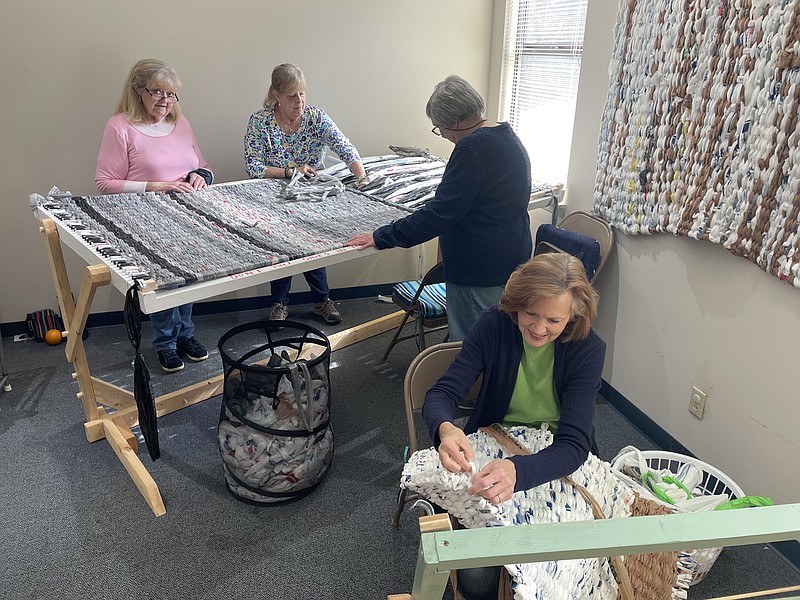If heaven were designing a knitting mill, it would look like the backroom at St. Alban's Episcopal Church on Hixson Pike.
From 1 p.m. to 3 p.m. on Tuesday afternoons, a makeshift workroom hums with happy conversation as a handful of women turn cast-off plastic shopping bags into so-called Mercy Mats.
Mercy Mats is the alliterative term for the hand-woven, 3-foot-by-6-foot roll-outs that serve as bug barriers, moisture blockers and cold-deflecting insulation for many of Chattanooga's homeless folks to sleep on.
The mats, which are produced by other local churches, as well, are systematically distributed to homeless encampments by the hundreds, along with blankets made from surplus upholstery donated to St. Alban's by the La-Z-Boy furniture plant in Dayton, Tennessee.
Few mat charities have the production process as streamlined as the women at St. Alban's, who assemble the Mercy Mats on handmade looms that can accommodate the hundreds of bags it takes to make a completed mat. Imagine a potholder loom the size of a sheet of plywood.
Elaine Hong, one of the leaders of the activity, has been part of the process from the start, which dates to pre-pandemic days when the women used a giant loom that could accommodate two or three weavers simultaneously.
To work through the pandemic, though, they switched to smaller looms that could make squares that were later assembled into full-size mats.
"For a few months (during the pandemic), we didn't meet," Hong said in an interview at the church. "Then, I thought, 'If I get some new looms made, and they're smaller, we could stay 6 feet apart.'"
Soon, smaller looms were constructed, and the operation was back in business.
Not only do the women get the satisfaction of helping the homeless community, but they also get a weekly venue for fellowship that's almost like an old-time quilting bee. Most Tuesdays attract a half dozen or more participants.
"I feel really happy to be here every Tuesday," Nicolette Settevendemie said. "We all have a lot of fun."
While the core of the group is comprised of the Episcopal Church Women's Group, anyone is welcome to join the circle.
"Not everybody who's here even goes to church here," said Tommie Sivils, a longtime mat maker. "We have a lady who is a Quaker who travels quite a bit. Another is a Baptist. One comes from the Catholic Church."
It takes a village to make Mercy Mats. Members of the church bring in their shopping bags and deposit them in boxes. Other volunteers tie them together in long strands the workers call "plarn" -- which is short for plastic yarn. Other times stores such as Dollar General will make bulk bag donations.
It takes hours upon hours to make a mat, tightly woven to provide protection and insulation. Sometimes, the women strive for patterns in the weaves, but often they sacrifice beauty for expedience.
In addition to the Mercy Mats and fabric blankets, the group hands out boxes filled with clothes and toiletry items to the homeless community.
Since the large homeless encampments on 11th Street near the Chatt Foundation have been dispersed, the group has to search out smaller clusters of homeless people living together around Chattanooga.
"It makes you feel good when you go hand this out, and it's stuff they need," Hong said.
Settevendemie added, "It's nice to talk to these people face-to-face and have a conversation with them. It makes you see they are people just like us."
For information on how to join the Mercy Mat makers at St. Alban's, call Hong at 423-309-3774.
Life Stories is published on Mondays. Contact Mark Kennedy at mkennedy@timesfreepress.com or 423-757-6645.
